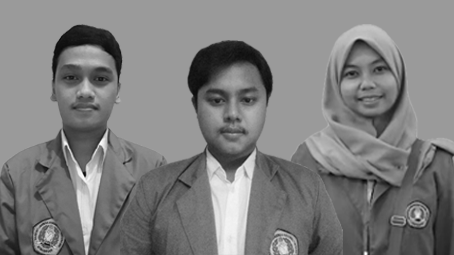UPNVY STUDENTS, FINDING WAY HOW TO IDENTIFY GOLD DEPOSITS

Sleman- Fauzi Yul Chaidir, Gilvandro Rumahorbo, and Okta Dwi Puspita, students of the Geophysical Engineering Study Program, Faculty of Mineral Technology, Universitas Pembangunan Nasional Veteran Yogyakarta (UPNVY) who were supervised by Hafiz Hamdalah, ST, M.Sc successfully passed the 33rd PIMNAS 2020 stage. PIMNAS 2020 will be held online through Zoom and livestream via Youtube PUSPRENAS (National Achievement Center) on 24-29 November 2020. Competing in the PKM-PE category (Exact Research-Student Creativity Week), the PKM title is "Method Integration. Geomagnetic and Induce Polarization. The purpose of this study is to determine the potential of gold deposits in the Randu Kuning, Selogiri, Wonogiri, Central Java area.
Fauzi Yul Chaidir as the Team Leader explained that this research was motivated by the increasing demand for gold, both for investment tools, industry and personal needs, while the supply of gold was decreasing day by day. Having these problems, the team conducted this research to determine the potential for gold deposits in the Randu Kuning area which is one of the areas with good gold prospects due to magmatic and mineralization processes.
"Tectonic activity as a trigger for the mineralization process will change the formation of bedrock minerals into sulfide minerals, one of which is gold. Gold is classified as a precious metal considering that gold has a high economic value compared to other metals. Wonogiri Regency, Selogiri District is one area that has the prospect of gold deposits resulting from the mineralization process. The area includes Jendi village, Kepatihan village and Keloran village which are included in the Randu Kuning hill area. In fact, there are community mines in the research location who work by following the structural pattern and the fractures that are filled with sulfide minerals to obtain gold. To determine the potential for underground gold deposits, it is necessary to analyze geophysical methods. Therefore, this research use two geophysical methods which are integrated, namely secondary data analysis with geomagnetic methods and literature studies using induce polarization." added Fauzi.
Fauzi added, "I hope that it can run smoothly from the preparation to the presentation day and hopefully the results of our research will have a real impact on both the government and the local community in order to make wise use of Natural Resources, and be useful for researchers or students who will do further research. We don't forget to ask for support and prayers from all of our colleagues in order to get the best results from the 33rd PIMNAS event in 2020. Public Relations / Vera Indratiami
 Indonesia
Indonesia  English
English